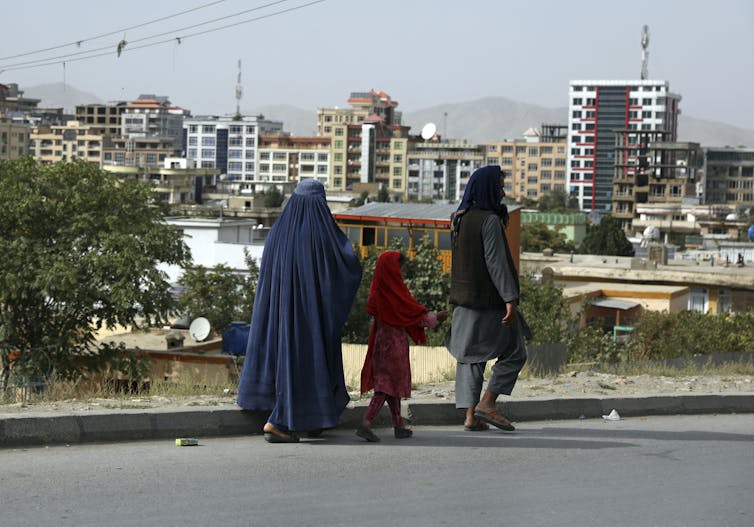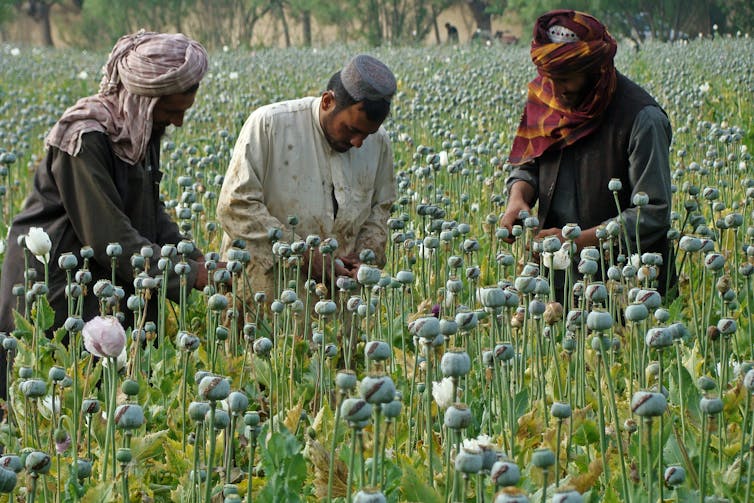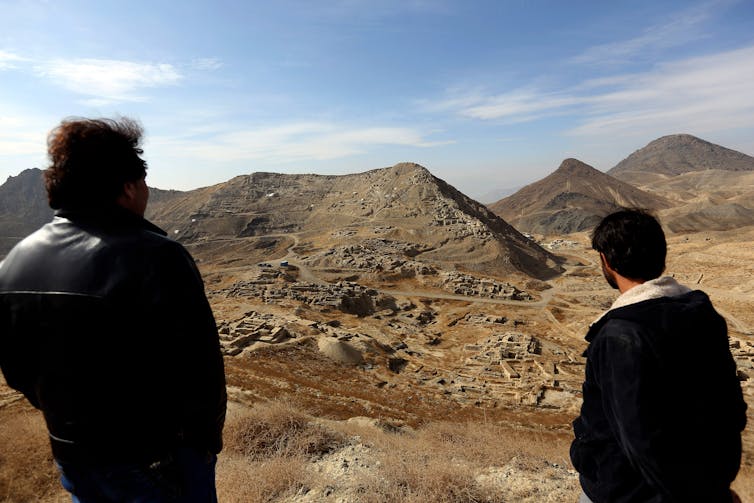How the Taliban might finance their new Afghan government
- Written by Hanif Sufizada, Education and Outreach Program Coordinator, University of Nebraska Omaha
Now that the Taliban have reportedly taken full control[1] of Afghanistan and begun forming a government[2], a looming challenge awaits: How will they keep their country and economy afloat financially?
For the past 20 years, the U.S. government and other countries have financed the vast majority[3] of the Afghan government’s non-military budget – and every cent of the fighting force[4] that melted to the Taliban so quickly in August 2021[5]. Now, with American aid likely out of the question and billions in central bank foreign reserves frozen, the Taliban will have to find other means to pay for salaries and support citizens and infrastructure.
I’ve been studying the finances[6] of the Taliban and American-backed government for many years as an economic policy analyst at the Center for Afghanistan Studies. Understanding how the Taliban will pay for their government begins with the last time they were in power over 20 years ago.
 Kabul has changed quite a bit in two decades.
AP Photo/Rahmat Gul
Kabul has changed quite a bit in two decades.
AP Photo/Rahmat Gul
Afghanistan has changed a lot
In the 1990s, Afghanistan was a very different country.
The population was under 20 million[7] and relied on international aid groups for the few services they could provide. In 1997, for example, the Taliban government had a budget of just US$100,000[8], which was barely enough for the salaries of government officials, let alone the entire country’s administrative and development needs.
Today, Afghanistan has changed markedly. The population has grown significantly, and its citizens increasingly came to expect services such as health care, education and basic utilities. In 2020, for example, Afghanistan had a non-military budget of $5.6 billion[9].
As a result, Kabul has been transformed[10] from a war-ravaged city into a modern capital, with a growing number of high rises[11], internet cafes, restaurants and universities.
Most of the developmental and infrastructure spending that has taken place since 2001 has come from other countries. The U.S. and other international donors covered about 75%[12] of the government’s non-military spending during those years. In addition, the U.S. spent $5.8 billion[13] since 2001 on economic and infrastructure development.
Still, government revenue[14] was beginning to cover a growing share[15] of domestic spending in recent years. Sources included customs duties, taxes, income from fees on services like passports, telecommunications and roads, as well as revenue from its vast but mostly untapped mineral wealth[16].
Revenue would have been a lot higher were it not for the government’s endemic corruption, which some experts and officials cite[17] as a key reason for its downfall[18]. A report from May 2021 suggested that $8 million was being embezzled[19] out of the country every day, which would add up to about $3 billion a year.
 The Taliban have made a significant share of their revenue in the past from the drug trade.
AP Photo/Abdul Khaliq[20]
The Taliban have made a significant share of their revenue in the past from the drug trade.
AP Photo/Abdul Khaliq[20]
Where the Taliban gets its money
Meanwhile, the Taliban had their own significant revenue streams to finance their insurgency as it gained control of the country.
In the 2019-2020 fiscal year alone, the Taliban raked in $1.6 billion[21] from a wide variety of sources. Most notably, the Taliban earned $416 million that year from selling opium, over $400 million from mining minerals like iron ore[22], marble and gold, and $240 million from donations from private donors and groups.
U.S. intelligence agencies and others believe that various countries, including Russia[23], Iran, Pakistan and China[24], have helped finance the Taliban.
With those resources, the Taliban were able to buy plenty of weapons and grow their military ranks as they took advantage of the U.S. withdrawal and conquered Afghanistan in a matter of weeks[25].
Afghanistan’s challenges
But winning the war may be easier than running the county, which faces many problems.
Afghanistan is currently enduring severe drought that threatens over 12 million people[26] – a third of the population – with “crisis” or “emergency” levels of food insecurity. Prices for food[27] and other essentials have soared, while most banks started to reopen with limited cash availability[28].
And like many countries, its economy has been hurt by COVID-19[29] – and some fear a resurgence in cases as vaccination rates plunge[30]. Many public health facilities face severe funding shortages[31].
The Taliban also face daunting financial challenges[32]. Roughly $9.4 billion in Afghanistan international reserves were frozen immediately after the Taliban took over Kabul. The International Monetary Fund suspended more than $400 million[33] in emergency reserves, and the European Union halted plans to disperse[34] $1.4 billion in aid to Afghanistan through 2025.
 A massive, untouched wealth of minerals, including lithium and copper, is hiding in Afghanistan.
AP Photo/Rahmat Gul[35]
A massive, untouched wealth of minerals, including lithium and copper, is hiding in Afghanistan.
AP Photo/Rahmat Gul[35]
5 potential funding sources for new government
Still, as they finish making their government and plotting a future course, the Taliban have a few sources they might be able to tap to generate enough money to run their reclaimed country:
Customs and taxation. Now that the Taliban are in full control of Afghanistan’s border crossings and government offices, they can begin collecting all import and other taxes.
Drugs. The Taliban have said it won’t permit Afghan farmers to grow opium[36] poppies as they seek international recognition for their rule. But they may change their mind if that recognition doesn’t come, in which case they may be able to continue to generate a significant source of revenue from drug smuggling. Afghanistan is said to be responsible for about 80% of global opium[37] and heroin supplies.
Mining. Afghanistan is estimated to have $1 trillion worth of minerals in its mountains and other parts of the country. China in particular has been eager to mine for these metals[38], which include ones that are critical to the modern supply chain, such as lithium, iron, copper and cobalt. This may not be possible in the short run, though.
Non-Western countries. Several governments have been reportedly helping the Taliban financially, including Russia, Qatar, Iran[39] and Pakistan[40], and these countries may continue to do so. After the previous Afghan government collapsed in August, I was told by ex-central bank officials that a country in the region, likely Qatar, injected millions of dollars to support the Afghan economy. China in particular stands out for its potential ties to the new government, as the Taliban have recently declared[41] the country their “principal partner.” On Sept. 8, 2021, China gave the government $31 million in emergency aid[42]. Besides mining minerals, China is also interested in extending[43] its Belt and Road Initiative[44] – a global infrastructure development project – into Afghanistan.
Western aid. Even with these other sources of income, I believe the Taliban will still be keen to restore aid from the U.S. and other Western countries and get rid of United Nations sanctions that have been in place since 1999[45]. The Taliban have said they intend to behave differently[46] than in the 1990s, including by respecting the rights of women and not permitting terrorists to operate from Afghanistan. And the EU, U.S. and other governments may want to use aid and frozen reserves as leverage to hold the Taliban to these promises.
[Over 110,000 readers rely on The Conversation’s newsletter to understand the world. Sign up today[47].]
References
- ^ have reportedly taken full control (www.npr.org)
- ^ forming a government (www.washingtonpost.com)
- ^ have financed the vast majority (www.nytimes.com)
- ^ every cent of the fighting force (www.military.com)
- ^ melted to the Taliban so quickly in August 2021 (www.washingtonpost.com)
- ^ I’ve been studying the finances (www.unomaha.edu)
- ^ population was under 20 million (countryeconomy.com)
- ^ Taliban government had a budget of just US$100,000 (yalebooks.yale.edu)
- ^ had a non-military budget of $5.6 billion (www.budgetmof.gov.af)
- ^ has been transformed (www.washingtonpost.com)
- ^ high rises (www.bbc.com)
- ^ U.S. and other international donors covered about 75% (www.nytimes.com)
- ^ spent $5.8 billion (apnews.com)
- ^ government revenue (documents1.worldbank.org)
- ^ to cover a growing share (www.usip.org)
- ^ vast but mostly untapped mineral wealth (theconversation.com)
- ^ some experts and officials cite (whistleblower.org)
- ^ key reason for its downfall (www.economist.com)
- ^ $8 million was being embezzled (tolonews.com)
- ^ AP Photo/Abdul Khaliq (newsroom.ap.org)
- ^ raked in $1.6 billion (theconversation.com)
- ^ mining minerals like iron ore (foreignpolicy.com)
- ^ Russia (www.npr.org)
- ^ Iran, Pakistan and China (www.rferl.org)
- ^ in a matter of weeks (www.cnbc.com)
- ^ threatens over 12 million people (www.nrc.no)
- ^ Prices for food (www.savethechildren.net)
- ^ banks started to reopen with limited cash availability (www.aljazeera.com)
- ^ its economy has been hurt by COVID-19 (www.worldbank.org)
- ^ resurgence in cases as vaccination rates plunge (www.washingtonpost.com)
- ^ face severe funding shortages (www.thenewhumanitarian.org)
- ^ daunting financial challenges (www.nytimes.com)
- ^ suspended more than $400 million (www.nytimes.com)
- ^ halted plans to disperse (www.courthousenews.com)
- ^ AP Photo/Rahmat Gul (newsroom.ap.org)
- ^ it won’t permit Afghan farmers to grow opium (www.wsj.com)
- ^ responsible for about 80% of global opium (www.cbsnews.com)
- ^ has been eager to mine for these metals (www.nytimes.com)
- ^ Russia, Qatar, Iran (www.mei.edu)
- ^ Pakistan (www.cfr.org)
- ^ have recently declared (www.telegraph.co.uk)
- ^ China gave the government $31 million in emergency aid (www.aljazeera.com)
- ^ is also interested in extending (www.scmp.com)
- ^ Belt and Road Initiative (theconversation.com)
- ^ United Nations sanctions that have been in place since 1999 (www.atlanticcouncil.org)
- ^ they intend to behave differently (apnews.com)
- ^ Sign up today (theconversation.com)

















